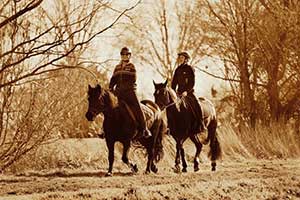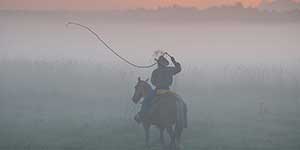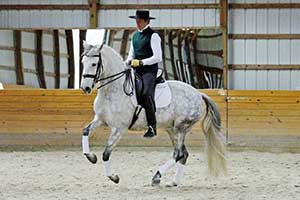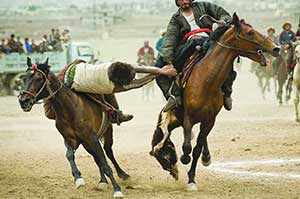Riding Disciplines
Welcome to Riding Disciplines which covers every English and Western riding style! The English riding covers Dressage, a ballet on horseback, Driving which features both the beautiful horses and the carriages they pull, Foxhunting, Eventing, Jumping, Saddle Seat, and even the sport of Polo.
The Western riding category includes Pleasure, Reining and all Rodeo events involving a horse, so look for Barrel Racing, Bronc Riding, Chuck Wagon Racing, Cutting, Pole Bending and Roping.
Want to know the date of your favorite horse show or rodeo? Don’t miss it! Dates and locations are included in the in both the Calendar of Events for English Riding and the Calendar of Events for Western Riding. Are we missing a category or event? Please use the useful feedback link and let us know!

by Louise Dando
Horses have always been a big part of my life.
I had my own during my teenage years. However, despite riding my friends horses, having a few different horses on part loan and taking riding lessons there have been large chunks of my adult life that have been horse free for one reason or another.
So I am going to share with you my 10 top tips for returning to riding!
1. Decide what you are aiming for.
Are you looking to buy a new horse or just take lessons? Are you looking to compete or are you happy trail riding?
Deciding this will be helpful when making decisions about everything later on. Like where to take lessons, what sort of horse to buy, where to board your horse & what your budget for all these things should be.

Photographer: Carlton Ward, Jr. | Writer: Derek Herscovici
To a Florida native, being called a “Cracker” is a compliment.
It recalls the grit and tenacity of laboring cowboys who came generations before them, from which the nickname, Florida Cracker, is derived. Many associate the cowboy with the Wild West, but few know that these bullwhip-toting ancestors shaped the landscape, history and economy that make Florida what it is today – and we’re proud to share the story of the term’s roots.
Spain’s attempts to colonize the interior of Florida were abandoned by the early 1700s. Spanish colonists retreated to the fortress towns of St. Augustine and Pensacola or departed for their Caribbean holdings in Cuba and Hispaniola (the island now made up of the Dominican Republic and Haiti), leaving behind massive herds of Andalusian cattle, an ancestor of today’s modern Texas longhorn.
Prized for the hardiness and resistance to parasites the breed had developed living in Florida, these cattle were turned loose or escaped their enclosures, multiplying and spreading across North America in record numbers. The cattle drove Florida’s economy for much of the 19th century and helped create today’s state economy. Without these cattle, the cracker cowboy, the most mythic of the Florida frontiersmen, would not have existed. Their descendants, the cowboys who moved out west, might not have either.

by Stacey Lorton
If you’re trying to decide what to do for the 4th of July weekend, we know the place to be! Prescott Frontier Days – World’s Oldest Rodeo has occurred annually over the 4th of July weekend since 1888 and has become one of the most famous rodeos in the states, most recently being nominated by USA Today as a contender for the best rodeo in America. Learn all about how the World’s Oldest Rodeo came to be, what to expect, and events you can’t miss during rodeo week!
Read more: Prescott Frontier Days 2019: World’s Oldest Rodeo

by Paul Belasik
When we were young, my siblings and I could get into some pretty vicious games. I can’t remember how many times my father would head out into the yard to calm things down. We would always hear the same refrain: In exasperation, he’d shout,
“Can’t you kids do anything without keeping score? Just play the game for the fun of it!”
When you see certain trends in your personality repeat, you wonder how much of this was deep inside you, written in your own DNA, and how much was trained into you. The more I became involved in dressage, the more I came to understand what my father had been trying to say. My affinity for concepts of Zen Buddhism seemed to take more hold. Early in college, when I first became aware of Zen advice—maybe because of the way I was raised, maybe because of who I was—it resonated deeply with me. Do a thing for the love of doing it. It seemed to validate my natural curiosity and give me a reason not to be too concerned with approval.
Read more: Can We Ride for the Fun of It? - Excerpt from "Dressage for No Country"

These polo-esque equestrian sports have been the life and blood of the Middle Eastern sports fanatic for the better part of the past millennium.
Since times immemorial, the Middle-East has been more or less the battlefield of the world. With regular conquests by the European Empires like Alexander’s Greek expedition or the Roman Empire’s conquests of invading the flatlands to the much recent American invasion of Afghanistan, the area has seen constant conflicts. Warding off the foreign invaders sooner or later, the Muslim rulers of the region have maintained a strong foothold over the region. One of the greatest strengths of the Ottoman/Persian armies was the exceptional performance of their cavalries. At one point in time, the Middle-East touted to have the best horsemen in the world. The durable and powerful Arabic horses complimented the riders’ ability perfectly.
Moreover, the constantly looming threat of foreign incursion has genetically imprinted a tenacious side on the perennial inhabitants of central Asia, the Turkic Nomads. Being on war campaigns which sometimes stretched out from months to years, the commanders of these large armies of the Ottoman/Persian had to find out viable ways for entertaining thousands of their fighting men. Sports like wrestling and boxing amongst others were relative hits amongst the troops but the community that enjoyed horse riding to a much greater extent felt a need to develop games which also involved the magnificent beast. Gradually, equestrian games which can be best described as archaic versions of Polo gained prominence in the Middle-east and were enjoyed in war times as well as during times of peace.
Most of the games, along with the various traditions involved, have withstood the wrath of time and are still prevalent to this day. The most notable ones, which often make appearances on various international media platforms, are described:
Buzkashi
Considered as one of the most dangerous sports of the world, Buzkashi, is definitely not a game for the weak nor for viewership of the faint-hearted. The sport was so brutal that Afghanistan’s biggest organized militia, the Taliban, banned the sport during its reign, terming it as too barbaric. Stylistically, the gameplay is extremely similar to Polo. The only minor alteration just to make the play a little more interesting is the replacement of the play ball with an animal carcass.
- Top 7 Ways To Spot An Effective Rider
- The Basics of Competitive Trail Riding
- Equestrian Vaulting is Finding a Foothold Among Children
- The Making of a Barrel Race Champion
- Three Ways the Judge Can Be Your Ally
- 9 Things You Need to Know if You Want to Ride Horses
- How to Design an Equitation Course
- Up & Coming Young Professional: Geoffrey Hesslink
- Career in Three-Day Eventing for The Pamplemousse
- How Can I Stop Bouncing In The Saddle?
- America’s Most Wanted Thoroughbred, Old Tavern, a Brave Polo Pony with Nerves of Steel
- A Horse With a Different Gear
- When Two Spines Align: Dressage Dynamics
- Three Secrets to Show Ring Success
- My Memorable Mentor
- North American Western Dressage gets punchy with Ranch Horse Western Dressage tests
- Jennifer Malott Kotylo - Movement & Body Awareness Specials for Equestrians, Introductory Video (1:33)
- Mario Dino Di Salvo at the Saratoga Polo Club
- Exercises for Horses That Are Beginning Pole Bending
- Zara Phillips targets Olympic gold with baby Mia by her side































